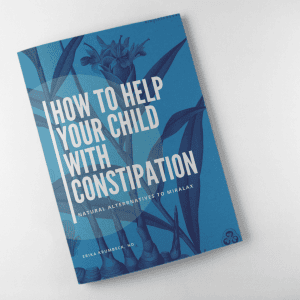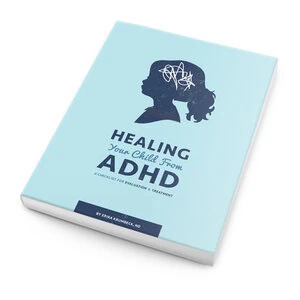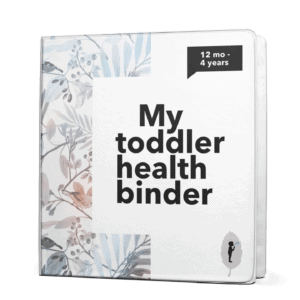The 5 Best Natural Sleep Remedies for Kids
Does the idea of your child sleeping through the night feel like a frustrating daydream? Most parents struggle with bedtime at some point in their kid’s lives. Insomnia is unfortunately common in people of all ages and it effects about 20% (i.e. 1 in 5) of children ages 5 to 12.[i] Up to 50% of kids will experience sleep issues during childhood.[ii]
How Much Sleep Do Kids Really Need?
Both sleep quality and quantity are important, because this is the primary time when the body rests and restores. According to the National Sleep Foundation within a 24-hour period is infants should sleep 12 to 15 hours, while toddlers need 11 to 14 hours, preschoolers need 10 to 13 hours, school-aged children need 9 to 11 hours, and teenagers should be sleeping at least 8-9 hours every night.
The timing of when kids fall asleep can make a big difference in sleep quality. Children from infancy to school-age seem to sleep better when they fall asleep between 7:00 and 8:00 p.m. On the other hand, children who go to bed after 9:00 p.m. often take longer to fall asleep, wake more frequently during the night, and end up sleeping less overall.[iii]
Negative Health Effects of Not Sleeping Enough
An astonishing 70% (i.e. 7 out of 10) of kids are not getting enough sleep at night, which can negatively affect their daytime behavior and school performance.[iv] When kids don’t get enough sleep they don’t necessarily act sleepy the way that adults do. In fact, they often become more hyper and irritable when they’re overtired, which can make it much harder for them to fall asleep and stay asleep. Lack of adequate sleep also increases the risk for obesity and metabolic syndrome, which in turn are risk factors for developing heart disease and Diabetes.[v]
Encouraging Healthy Sleep Routines
To help your child get a better night’s sleep it’s essential to have a relaxing evening and bedtime routine. Watching television or using computers or tablets before bed can make it much harder to fall asleep easily. This is because the blue light that is emitted by electronics causes the body to delay release of melatonin, the hormone responsible for making us sleepy at night.[vi] Instead of spending time on electronics, taking a bath and reading bedtime stories can help your child to relax and get ready for sleep.
Eating or drinking things with sugar and caffeine in the evening can also make it difficult for your child to sleep soundly. Sugar and caffeine have a stimulating effect on the body and can lead to hyperactivity in kids. If your child needs an evening snack, try something that includes complex carbohydrates, protein, and healthy fats. Some examples you might try are carrots and hummus, whole-wheat toast or crackers with peanut butter, or apple slices with almond butter. Combining nutrients in this way helps to prevent the highs and lows in energy and mood that can come from sugary and processed foods.
The 5 Best Natural Sleep Remedies for Kids
If changing your child’s bedtime routine isn’t enough to help them sleep, here are five of my favorite natural treatments that may help:
Chamomile
Chamomile (Matricaria chamomilla, Matricaria recutita) is my favorite all around herb for kids. Historically, it has been used to treat everything from colds, teething pain, colic, indigestion, restlessness, anxiety, and irritability. It is the perfect herb for cranky infants and children who can’t settle down enough to fall sleep. Chamomile tea is readily available from many grocery and natural health stores. A small amount of honey can be added for children over 12 months old to make the tea even tastier. Chamomile is generally considered very safe, but because it is in the Asteraceae (i.e. daisy) family it shouldn’t be given to anyone with an allergy to other plants in this family.
Magnesium
Magnesium is a naturally occurring mineral and an essential nutrient. Magnesium has a calming effect on the nervous system and may help to promote restful sleep. A good dosage for most children ages 2 to 8 year old is 100 mg of magnesium at bedtime. The recommended upper daily limit for older children and adults is 350 mg.[vii] More is not always better and if you ingest too much magnesium it can cause abdominal pain, cramping, diarrhea, and low blood pressure.
The type of magnesium in your supplements can also make a big difference! Magnesium supplements are often prepared by combining magnesium with organic and amino acids in order to make them more chemically stable and to improve absorption. The type of organic acid that the magnesium is mixed with can alter of the effects of the supplement. For example, magnesium citrate and magnesium oxide tend to have laxative effects, which your child may or may not need. Magnesium glycinate has the least laxative effect and it may be a good choice for people with sensitive digestive systems. Other common forms of magnesium include magnesium malate, magnesium aspartate, and magnesium threonate.
California Poppy
California Poppy (Eschscholzia californica) is a very gentle herb to calm the nervous system. It is useful for restlessness, pain, and sleeplessness. Although related to other types of poppies, California Poppy does NOT contain opium or opiates and it is very safe for kids over the age of 2 years. California Poppy is included in a lot of calming herbal formulas, including one of my favorites: Wise Woman Herbals Kalmerite Glycerite.
Lavender
Just the smell of lavender (Lavandula angustifolia) is relaxing to most people and it’s widely used in aromatherapy to calm the nervous system and promote restful sleep. Lavender bath products can be before bed or you can spritz a few drops of organic lavender essential oil on your child’s pillowcase. You can also involve your child in a fun craft project to make lavender dream pillows.
When using essential oils don’t apply them directly to the skin because they can be irritating or even cause chemical burns. Use extra caution when using essential oils around infants and children who have asthma. For more information on the safe use of essential oils for children, Dr. Erika Krumbeck has written a wonderfully helpful guide.
Regular Physical Activity
Okay, so it’s not really a “treatment,” but if your child spends a lot of time sitting still during the day they may not be sleeping as well at night. Our bodies needs regular physical movement and exercise to burn off energy so that we are tired enough to sleep well at night. A good goal is to make sure your child is getting at least 30 minutes of unstructured outdoor time every day to run around. Getting them involved in sports, gymnastics, martial arts, or other group exercise programs can also be helpful.
Although sleep issues are very common and often relatively harmless, if your child experiences chronic insomnia it may be related to a more serious medical condition and you should consult your family doctor. Sleep disorders in children and adolescents can be a sign of anxiety, depression, ADHD, thyroid disease, sleep apnea, and even asthma.
References:
[i] Calhoun SL, Fernandez-Mendoza J, Vgontzas AN, Liao D, Bixler EO. Prevalence of insomnia symptoms in a general population sample of young children and preadolescents: gender effects. Sleep Medicine. 2014 Jan;15(1):91-5.
[ii] Carter KA, Hathaway, NE, Lettieri CF. Common Sleep Disorders in Children. American Family Physician. http://www.aafp.org/afp/2014/0301/p368.html. Published March 1, 2014. Accessed February 28, 2017.
[iii] Help Kids Sleep All Night. WebMD. http://www.webmd.com/children/features/help-kids-sleep-all-night#1. Accessed February 28, 2017.
[iv] Mindell J. How Can My Child Get More Sleep? National Sleep Foundation. https://sleepfoundation.org/ask-the-expert/how-can-my-child-get-more-sleep. Accessed February 28, 2017.
[v] Li L, Zhang S, Huang Y, Chen K. Sleep duration and obesity in children: A systematic review and meta-analysis of prospective cohort studies. Journal of Paediatrics and Child Health. 2017 January.
[vi] How Blue Light Effects Kids & Sleep. National Sleep Foundation. https://sleepfoundation.org/sleep-topics/how-blue-light-affects-kids-sleep. Accessed February 28, 2017.
[vii] Magnesium. Linus Pauling Institute. http://lpi.oregonstate.edu/mic/minerals/magnesium. Published January 3, 2017. Accessed February 28, 2017.

- Product on sale
 How to Help Your Child with Constipation – Natural Alternatives to Miralax (E-book)Original price was: $25.00.$15.00Current price is: $15.00.
How to Help Your Child with Constipation – Natural Alternatives to Miralax (E-book)Original price was: $25.00.$15.00Current price is: $15.00. - Product on sale
 Healing your child from ADHD (E-Book)Original price was: $25.00.$15.00Current price is: $15.00.
Healing your child from ADHD (E-Book)Original price was: $25.00.$15.00Current price is: $15.00. -
 My Toddler Health Binder (Printable E-book)$18.00
My Toddler Health Binder (Printable E-book)$18.00 - Product on sale
 How to do an elimination/challenge diet (E-Book)Original price was: $10.00.$5.00Current price is: $5.00.
How to do an elimination/challenge diet (E-Book)Original price was: $10.00.$5.00Current price is: $5.00.

Riaa
April 26, 2023 at 6:09 amThis is absolutely right. Insomnia in children has raised hugely in today’s world. More insight on this topic can be taken from this article.
https://www.aarthaarogya.com/2023/04/26/insomnia-in-children/
Amayra
October 21, 2022 at 1:27 amits really useful information. thanks for sharing it.
Deepika
September 15, 2022 at 4:21 amGood blog for sleep remedies, for good healthy and peaceful sleep use, sleep well gummies.
Beth Price-Almeida
March 13, 2022 at 10:11 pmMy son is 7 and has never been a good or ‘usual’ sleeper. If he falls asleep before 9 p.m., he’s awake no later than 2 a.m. without fail. He can keep himself awake until 4 in the morning and I STILL have to make him lay down and be still. I can leave my room in the morning, and it’s like he has a guard posted to wake him up because he will roll out of the bed the instant he hears my …. Breath I guess. I’ve run out of ways to help ands now it’s just almost like there’s nothing that will fix it.
Ramya
April 14, 2021 at 8:11 pmMy kids sleep at night is restless and hence he is cranky during the day. Chamomile tea at night gives him restful sleep. Is chamomile safe to be given to kids on a daily basis ?thanks.
Pingback: Chocolate Chamomile Moon Milk for Kids :: paleo, GAPS
June 29, 2020 at 5:52 pmBlack Tiger
April 12, 2019 at 1:24 amAwesome….Check This Also https://www.heaalthcaare.in/2019/04/way-to-help-sleep-kid-naturally.html
damnyankee21
November 26, 2017 at 8:02 pmI just ordered some of the KALMERITE GLYCERITE for my 3 yr old…would you happen to know the appropriate dosage for a child? Thanks.